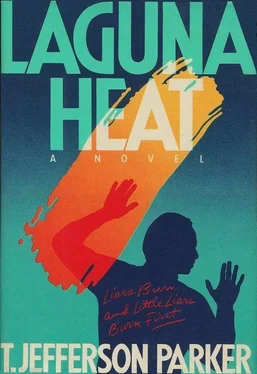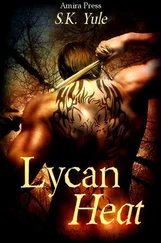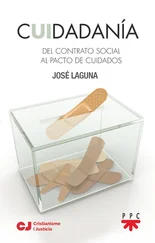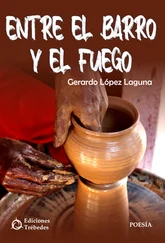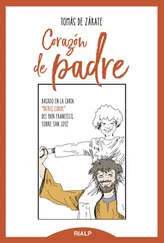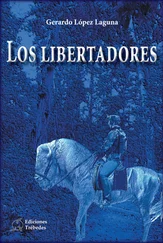Shephard followed the perimeter of the jungle, which zigzagged along a series of peaceful coves. The sand was soft underfoot, and the air was tinged with the clean and reassuring smell of ocean.
The outline of the Hotel Cora grew larger as he rounded a small lagoon. Behind him he could hear the busy chatter of the jungle, and in front the ocean against the shore. He stopped for a moment to look behind him and studied the series of tiny footprints that trailed off into the darkness from which he had come. The far side of the lagoon ended in an outcropping of dark rocks, which in the pale moonlight he saw was alive with iguanas, loafing in and out of each other’s shadows. No wonder they eat them, he thought, big as pheasants.
He cautiously rounded the rocks, looking up when he reached a dilapidated boardwalk that had once served as an entrance to the Cora. The hotel stood above him, large and decrepit, the sagging posture of the unused. Against the main wall, which was now covered by foliage nearly to the center, the words Hotel Cora were written in graceful wrought-iron letters. One of the wooden double doors was all but torn away, left dangling by a disfigured hinge. An iguana pulled itself across the porch, then dragged its dark weight up the decaying flanks of the colonnade. Shephard could hear its claws finding their way through the rotted wood. He studied the three floors of darkened windows, only a few still with glass. Two years, he thought, may as well be two centuries in the jungle. The glass of an upper-story window, the one farthest from the entrance and nearest to the water, seemed for an instant to move.
Shephard backed away from the boardwalk and stepped down onto the sand. He kept near the front of the building, squinting at the window, now with a copper glow behind it, now with an orange flicker.
Candlelight.
And a moment later the silhouette of a man at the window, looking down at the sea.
He watched the orange spot of a cigarette rise, brighten, trace downward again. A moment later, the man moved away.
Shephard worked his way back to the hotel porch, whose boards sagged pliantly underfoot. The iguana twisted around the colonnade as he passed it, keeping to the deepest shadows. He ducked through the broken door of the lobby and stepped inside, waiting for his eyes to adjust to the greater darkness of the once-splendid Hotel Cora. The lobby smelled of rotted wood and mildew. Out of the blackness, shapes began to solidify: the desk was to his right; two columns rose ahead of him; behind them a wide set of stairs swept upward from the lobby floor to the upper stories. Its balustrade gaped with holes, and some of the pillars still lay scattered on the floor where age, or vandals, had dumped them.
As Shephard’s eyes strained in the darkness he saw that the shapes were blurred and rounded, and a moment later he realized that everything in the lobby, from the walls to the strangely lumpy desk to the drooping chandelier above him, was covered with a carpet of jungle moss. He crouched and ran his fingers along the floor: the moist springiness of sphagnum gave way to cool tile. A rat squeaked, scampering across the moss in front of him.
He padded his way to the stairs and tentatively tried the first step. It was stout and resilient. Good, he thought, concrete or stone. He rose a step at a time, careful to test each plank before putting down his weight. High as the chandelier now, he stopped and looked down over the moss-draped lobby below him. Above the entryway door, a broken window gave him a view of the Caribbean, which lay flat and unperturbed to the east. The moon hovered low over the horizon, like a last beacon for travelers at the end of the world.
The stairway widened, easing onto the second floor. He stopped at the head of the stairs, unsure of how to go around the gaping hole in front of him. Below, he could see the door through which he had come twisted obscenely out and hanging by the stubborn hinge. Finally, he stepped across, his foot hitting the solid plank of the next step. Pushing off the mossy handrail, he heaved himself over the hole and onto the stairway, teetering momentarily when his full weight hit the other side. His shirt and jacket were soaked through, and his own smell was as strong as the smell of decay around him. The holster scraped against his wet ribcage, leather on soggy cloth.
As he took the last steps upward, his hand on the balustrade for balance, Shephard felt his stomach beginning to weaken as the anger that had brought him this far began to disappear. He stopped, listened to the shallow quickness of his breathing, heard his heart thumping in his ears. The darkness worried him. He considered settling onto the stairway to sleep until daylight, and finishing what he had come to do in the clean light of morning. Would Mercante come peacefully? Did he have the gun? Was he alone? Shephard conjured visions of his mother, her golden hair shifting as she played tennis, her smile as she held her son in her arms on the Surfside beach. Then he saw Hope Creeley again, and Algernon’s head blighted by the sharp rock as he lay by the stables, and Jane’s grieving face as she spoke of him in his living room the day after. He thought of his father on the witness stand, his long jumps from the pier at night.
Everything, Shephard thought, had its seeds in the man he had come to find. He stepped from the stairway onto the third floor and carefully began making his way to the outside balcony that would take him to the room at the far end.
With his back to the building, Shephard moved onto the balcony and stepped past the window of the first room. Lizards scattered over the railing as he moved, quicker and more agitated with the nearness of morning. Far to the east, he could see the first mellowing of the black, a fading of stars, the moon giving up its crisp outline.
Two rooms beyond, the window at the end still glowed. He opened his left palm against the wall for support and brought the Python from its holster with his right. Revolver in hand, he could feel the old terror creeping back into him — Pico Boulevard in the rain, Morris Mumford on the wet grass — and he wondered if when the time came, he would be able to make the gun obey his trembling fingers. Too-Long Tom, Too-Long Tom. With his back flattened against the building, Shephard edged to the last window, waited, then looked in.
The man sitting at a table, his face turned downward to a book, was Azul Mercante. Two candles threw a burnished orange light onto his old and wrinkled face. He turned a page of the book — Shephard saw it was a Bible — yawned, then looked at his wristwatch.
Keeping close to the wall, Shephard crept back to the balcony entrance and turned into the hallway, breathing rapidly.
With the rooms to his right, he stepped carefully across the moss-heavy floor, past the first three doors, over a small crevice to the last. The hallway was narrow; he gauged that two yards’ running start was all he would have. He heard the blood rushing in his head. What if the door were as stout as Rubio’s? Directly in front of it now, he moved his back to the wall opposite. Christ, he thought, won’t the pounding stop so I can think; and he shoved off the wall, charged across the hallway, lowered his shoulder into the soft door, and crashed through. Splinters showered his head as the wood shattered. Light. But no movement. Only the glow of candlelight and the calm and hateful stare of Azul Mercante.
Shephard had the man’s face just over the front sight of his pistol. He was surprised how familiar it looked, how well he knew the haughty eyes, the superior smirk, the wide forehead and dangling gray hair.
“I’m on target, asshole. Don’t even blink.”
Mercante was standing, his hands flat on the table in front of him. He was thin, and shorter than Shephard had imagined. His shirt looked new. From the stare in the man’s eyes, Shephard seemed to have made no impression whatsoever; they considered, then dismissed him. The full madness of the man didn’t hit Shephard until Mercante finally spoke.
Читать дальше
